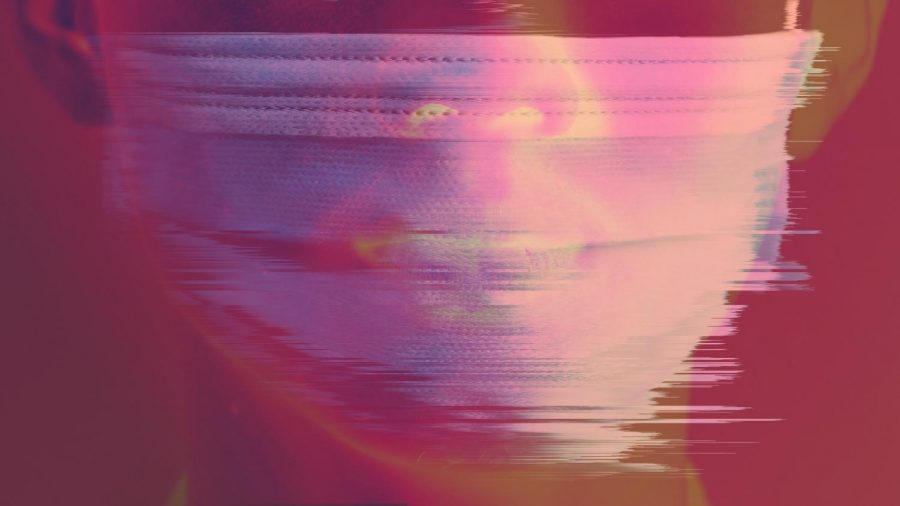Buening: H.B. 60 Threatens to Extend the Pandemic
(Design by Sydney Stam | The Daily Utah Chronicle)
January 28, 2022
COVID-19 is not gone. The omicron variant continues to tear through communities worldwide, Utah included. Here, new infections have risen by about 400% over the last two weeks. As of Jan. 17, we rank fifth among states where the virus is spreading the fastest on a per-person basis and third for the highest average daily case rate. These high transmission rates have overwhelmed our healthcare system. As of Jan. 6, only 1 in 100 of hospitalized COVID-19 patients had access to treatment.
On our current trajectory, the future doesn’t look very promising. The CDC anticipated that by the end of January, Utah will face somewhere between 12,600 and 38,800 new cases per day. And yet, this dilemma hasn’t stopped Utah’s legislators from exacerbating the problem. In Utah State Legislature, two Republican legislators have chosen to sponsor H.B. 60, the “Vaccine Passport Amendments.” This bill aims to make it unlawful for various entities to require proof of immunity status.
H.B. 60 is one of many attempts Utah legislators have made to undermine COVID-19 action. Make no mistake, the provisions of H.B. 60 will prolong the pandemic by giving people an avenue to avoid vaccination.
History of Utah’s COVID-19 Action
Since the beginning of the pandemic, many Utah lawmakers have shown their refusal to comply with COVID-19 protocols. Instead, they have used their authority to usurp their constituents’ best interests.
In response to initial masking and social distancing restrictions, Utah lawmakers showed their frustration by redistributing the state’s emergency powers. Upset by former Gov. Herbert’s face-covering mandate, conservative legislators sought to diminish executive power. As a result, most efforts to enforce mask orders have gone overturned. This action has also slowed relief response. Now, the legislature is the most powerful it has ever been, without the checks and balances to stop it.
These same lawmakers chose time and time again, to rush the reopening of Utah’s economy in 2020. Countless public health experts, including state epidemiologist Dr. Angela Dunn, warned against such premature actions. Unsurprisingly, they were ignored.
In November of 2021, Gov. Cox and others objected to the Biden administration’s vaccine requirement — which attempted to make businesses with 100 or more employees require vaccinations or weekly COVID-19 testing for their workers. Although the mandate got struck down by the Supreme Court earlier this month, the governor’s reaction foreshadowed today’s horrible decisions.
Vaccinate, Vaccinate, Vaccinate
Getting vaccinated is the single most important contribution you can make to help curb COVID-19. Before the emergence of variants, we would have needed 70 to 85% of the population vaccinated to reach the herd immunity threshold. Meanwhile, only 59.6% of all Utahns are fully vaccinated — a far cry from any estimate of what’s necessary.
Our COVID-19 cases are likely an underestimate from reality. Gov. Cox has asked people with less severe symptoms to stop seeking testing in lieu of test shortages. Here at the University of Utah Hospital, 50 beds have been closed due to COVID-19 related staffing shortages.
Medical experts have confirmed that now, “Everyone ages 5 or older can get vaccinated against COVID-19.” Medical exemptions do exist, but as epidemiologist, Dr. David Dowdy said, “Other than age, there are no major exemptions that cover large groups of people.” Medically exempted people give us more reason to vaccinate since the power of herd immunity helps to protect them too.
H.B. 60 Idiocracy
When Gov. Cox and others first opposed the Biden administration’s vaccination mandate, they stated that “Workplace vaccination and testing policies should remain firmly the prerogative of business owners.” That initial statement was already deeply problematic, owing largely to many workers’ inability to ensure protection from their own colleagues. H.B. 60, however, goes even further in endangering worker safety.
Its text stipulates that “with certain exceptions,” it would be “unlawful discrimination for an employer to require proof of immunity status.” With this, not only would workers have no control over the vaccination status of those they must work around, but employers don’t either. This policy makes it look like Rep. Brooks and Sen. Kennedy are trying harder to prohibit vaccination than encourage it. Brooks has claimed that it’s “un-American” for people to have to show vaccination identification at normal businesses. I guess prioritizing the health of his constituents is “un-American,” too.
The bill would also prohibit places of “public accommodation” from “[discriminating] against an individual based on the individual’s immunity status.” It is someone’s prerogative whether they want to get vaccinated, sure. But individual rights don’t always hold in places of “public accommodation.” When your actions infringe upon the health of another, it’s no longer a matter of individual freedom.
Finally, it would, “with certain exceptions, [prohibit] a governmental entity from requiring proof of immunity status.” By removing this power of the government, H.B. 60’s sponsors all but ensure a prolonged, more serious pandemic.
Failure to encourage vaccination makes COVID-19 worse. The impacts of these decisions go far beyond increasing sickness. Our lawmakers need to recognize that as more space is taken up in hospitals and more essential workers get sick, more people are denied care. To put it simply — people have died, people will continue to die and Utah legislators continue to prove that they do not care. By providing even more exemptions to COVID-19 vaccination policies, our lawmakers would ensure an even more dangerous future.











Tanner P • Feb 5, 2022 at 12:59 pm
Sarah that was the single worst article I’ve ever read. This isn’t an OP-ED, Your inability to write an article without an attempt to even sound somewhat objective is embarrassing. Should have saved this one for your personal journal.
Sad!
Tanner P • Feb 5, 2022 at 1:02 pm
But hey you can write in your description that your an “opinion” journalist. But nothing about this article displays until you research the author. Click bait garbage journalism.
Iris • Jan 29, 2022 at 1:41 pm
Totally baffling that in 2022, our health policies are refuted by a loud course of ignorance.
Vaccines work.
Stupidity kills
Voice of reason • Feb 28, 2022 at 1:42 pm
Then why aren’t all of the unvaccinated dead or dying in the streets….this is not a vaccine and it does not work. Who’s the arrogant ignorant ones pushing something that doesn’t work. How about you allow people to make their own choices without force. If the vaccines work, then me not getting one will not affect those that DO! Thats how a real vaccine works….so I guess you’ll die of stupidity someday then as you stated.